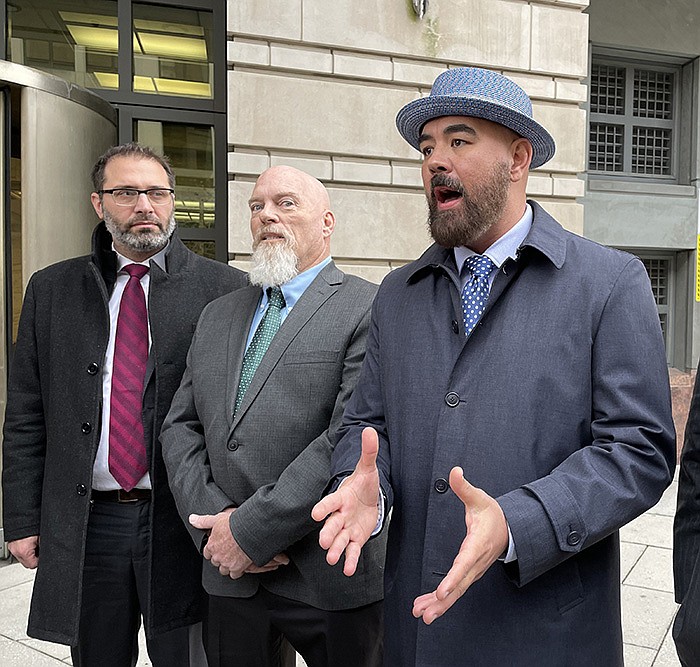WASHINGTON -- A federal judge in the District of Columbia has denied Richard "Bigo" Barnett's motions for acquittal or a new trial.
U.S. District Judge Christopher R. Cooper issued the order late Tuesday, on the eve of Barnett's sentencing, which is scheduled for 1 p.m. today.
After a two-week trial in January, a jury deliberated for a little over two hours before finding Barnett guilty on all eight counts he faced in connection with the U.S. Capitol riot of Jan. 6, 2021.
Barnett faced enhanced charges for carrying a dangerous weapon -- a stun gun -- into the Capitol. While in the building, he posed for photographs with his foot on a desk in House Speaker Nancy Pelosi's office suite.
Barnett was also found guilty of interfering with a police officer who was trying to perform his duties during a civil disorder.
"He unlawfully carried a dangerous stun gun into the Capitol and interfered with law enforcement's ability to control the riot by threatening an officer and refusing orders to leave the building," Cooper wrote in Tuesday's order.
Federal prosecutors want Barnett sent to prison for 7.25 years. His attorney, Jonathan Gross, says a sentence of one year would be sufficient.
According to Cooper's order on Tuesday, Barnett raised "a variety of challenges" to his conviction.
"Among other claims," wrote Cooper, "Barnett asserts that: there was insufficient evidence to convict him of any count, the jury instructions contained a number of prejudicial errors, the government committed a Brady violation, the government's demonstration at trial of the electric stun device that Barnett brought to the Capitol was improper, a portion of the government's closing argument was unsupported by evidence, and every key government witness committed perjury. Rejecting each challenge, the Court will deny the motions and sustain the convictions."
Cooper went through each challenge in his 33-page order.
Barnett's lawyers had argued that he didn't interfere with Metropolitan Police Officer Terrence Craig in the Capitol Rotunda. Barnett had repeatedly asked Craig to retrieve an American flag he had left in Pelosi's office suite.
Then his requests took on a more menacing tone.
Craig was part of a police line trying to block rioters in the Rotunda from reaching further into the Capitol.
"The government presented substantial evidence that Barnett interfered with Officer Craig's ability to respond to the civil disorder," Judge Cooper wrote in Tuesday's order. "Officer Craig described how Barnett belligerently invaded his personal space, requiring his attention and preventing him from addressing other threats or aiding fellow officers. Evidence also showed that Barnett repeatedly threatened to instigate the crowd to push through the police line if Officer Craig did not leave his post to retrieve Barnett's American flag, which was affixed to a ten-pound metal pole, from the Speaker's offices. Barnett admitted as much in his own testimony."
[DOCUMENT: Read Judge's ruling on Richard Barnett case
» arkansasonline.com/24Barnett/]
Cooper cited the trial transcript, in which Barnett testified, "After I begged [Officer Craig] a little bit, I started acting like a four-year-old and making stupid nonsensical threats."
"By the Court's count, Barnett threatened Officer Craig at least fifteen times; the jury could have found any one of those threats sufficient for a conviction," wrote Cooper. "Barnett was also seen in body-worn camera footage making what appears to be a 'come here' gesture to the crowd. While Barnett testified that he was gesturing to a photographer to capture a 'major scuffle' occurring between protestors and the police, a reasonable juror easily could have credited the government's alternative theory that he was carrying out his threat to call over more protestors. ...
"Barnett also baldly asserts that the government 'provided no evidence of [his] intent' to impede or obstruct Officer Craig," wrote Cooper. "But the jury could well have inferred from the evidence that Barnett threatened Officer Craig in order to get him to leave the police line and that he waved over other protestors so that they would push him through the line of officers."
Barnett's attorneys argued that key government witnesses testified to "material facts that are are verifiably and objectively false" and their testimony should be set aside.
"The Court found the government's witnesses generally credible and defers to the jury's assessment of their testimony," wrote Cooper. "Barnett's concerns raise, at best, minor issues of memory and perception that are appropriately addressed through cross-examination, not a new trial. Barnett was permitted to confront the government's witnesses about these areas of testimony and often did so. It was for the jury to decide whether the testimony, corroborated by other evidence, justified a conviction. The Court discerns no colorable credibility concerns on the part of the government's witnesses, let alone a miscarriage of justice requiring reversal of the jury verdict."

